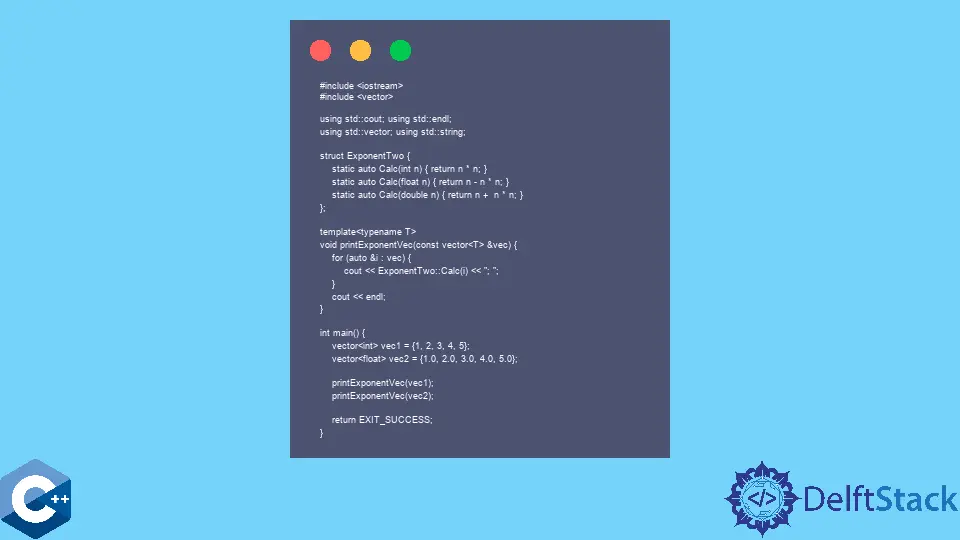C++의 함수 오버로딩

이 기사에서는 C++에서 함수 오버로딩을 사용하는 여러 방법을 보여줍니다.
C++에서 오버로드 된 함수 정의
함수 오버로딩은 다양한 유형의 개체에 적용 할 수있는 함수를 제공하는 임시 다형성의 일부로 알려져 있습니다. 즉, 이러한 함수는 주어진 범위에서 동일한 이름으로 정의되며 인수의 수 또는 유형이 달라야합니다. 오버로드 된 함수는 컴파일 타임에 해결되는 여러 함수 집합 일뿐입니다. 후자의 기능은 가상 기능에 사용되는 런타임 다형성과 구별됩니다. 컴파일러는 인수 유형을 관찰하고 호출 할 함수를 선택합니다.
오버로드 된 함수는 매개 변수 유형 또는 여러 매개 변수가 달라야합니다. 그렇지 않으면 컴파일러 오류가 발생합니다. 오버로드 된 함수간에 반환 유형이 다르거 나 별칭이 지정된 유형이 인수로 사용되는 경우에도 컴파일러는 오류와 함께 실패합니다. 다음 예제에서는 숫자 합산을위한 3 개의정적함수가있는Math구조를 구현했습니다. 각 함수는 서로 다른 유형의 인수 쌍을 취하고 해당 유형을 반환합니다. 결과적으로Math::sum은 다른 유형의 벡터 요소로 호출 될 수 있습니다. struct키워드는 C++에서 클래스를 정의하며 해당 멤버는 기본적으로 공용입니다.
#include <iostream>
#include <vector>
using std::cout;
using std::endl;
using std::string;
using std::vector;
struct Math {
static auto sum(int x, int y) { return x + y; }
static auto sum(float x, float y) { return x + y; }
static auto sum(double x, double y) { return x + y; }
};
int main() {
vector<int> vec1 = {1, 2, 3, 4, 5};
vector<float> vec2 = {1.0, 2.0, 3.0, 4.0, 5.0};
for (const auto &item : vec1) {
cout << Math::sum(item, item * 2) << "; ";
}
cout << endl;
for (const auto &item : vec2) {
cout << Math::sum(item, item * 2) << "; ";
}
cout << endl;
return EXIT_SUCCESS;
}
출력:
3; 6; 9; 12; 15;
3; 6; 9; 12; 15;
C++에서 템플릿과 함께 오버로드 된 함수 사용
템플릿은 C++ 언어로 구현 된 일반 프로그래밍의 한 형태입니다. 둘 다 컴파일 타임에 추론되므로 함수 오버로딩과 유사한 기능을 가지고 있습니다. 다음 코드 스 니펫에는 일반 벡터의 요소를 출력하는printExponentVec함수가 있습니다. 따라서 각 유형에 대해 동일한 작업을 수행하는 데 활용되지만 다른 유형에 대해 서로 다른 함수 본문을 구현하려면 함수 오버로딩을 사용해야합니다.
#include <iostream>
#include <vector>
using std::cout;
using std::endl;
using std::string;
using std::vector;
struct ExponentTwo {
static auto Calc(int n) { return n * n; }
static auto Calc(float n) { return n - n * n; }
static auto Calc(double n) { return n + n * n; }
};
template <typename T>
void printExponentVec(const vector<T> &vec) {
for (auto &i : vec) {
cout << ExponentTwo::Calc(i) << "; ";
}
cout << endl;
}
int main() {
vector<int> vec1 = {1, 2, 3, 4, 5};
vector<float> vec2 = {1.0, 2.0, 3.0, 4.0, 5.0};
printExponentVec(vec1);
printExponentVec(vec2);
return EXIT_SUCCESS;
}
출력:
1; 4; 9; 16; 25;
0; -2; -6; -12; -20;
Founder of DelftStack.com. Jinku has worked in the robotics and automotive industries for over 8 years. He sharpened his coding skills when he needed to do the automatic testing, data collection from remote servers and report creation from the endurance test. He is from an electrical/electronics engineering background but has expanded his interest to embedded electronics, embedded programming and front-/back-end programming.
LinkedIn Facebook